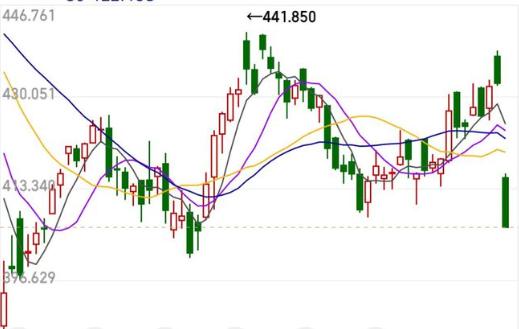
Yesterday, the three major indexes of the US stock market closed down, the Dow fell 0.86%, the S&P 500 fell 0.29%, and the Nasdaq fell 0.09%. Major European stock indexes closed down, with Germany's DAX30 down 2.13%, Britain's FTSE 100 down 1.22% and France's CAC40 down 2.69%. About three-quarters of stocks on the New York Stock Exchange fell Tuesday, compared with about 63 percent on the Nasdaq, the data showed. Measured by volume, decliners on the NYSE accounted for about 71 percent of the total volume, while those on the Nasdaq accounted for about 59.5 percent of the total volume.
The broad decline in U.S. and European stocks may have multiple effects. First, the impact on investors and the market is that stock market declines are often accompanied by capital outflows, especially from riskier assets. This could lead to changes in the pattern of global capital flows, with implications for national financial markets and the real economy. Changes in capital flows can also trigger exchange rate fluctuations. For example, if a large amount of money is withdrawn from emerging markets, it could cause their currencies to depreciate. As an important bellwether of the global economy, US and European stocks have fallen across the board, often leading to increased investor panic and a serious blow to market confidence. In the case of a falling stock market, investors are more inclined to invest funds in less risky assets, such as gold, Treasury bonds and other safe haven assets, which further push up the price of these assets and exacerbate the downward trend of the stock market. As an economic barometer, the performance of the stock market directly affects investors' confidence in the global economy. The broad decline in U.S. and European stocks could lead to a setback in investor confidence, further affecting the investment climate in global markets. The stock market decline is often accompanied by a decline in market risk appetite, and investors may be more inclined to invest funds in less risky assets, such as gold, Treasury bonds and other safe haven assets, which may lead to an overall reduction in risk appetite in the global market.
The second is the impact on financial markets, because the US stock market is regarded as A bellwether of the global market, its fluctuations tend to be quickly transmitted to other markets, especially A-shares. The decline in the US stock market may lead to A lower opening of A shares, or even maintain a downward trend throughout the day, increasing the selling pressure on the A-share market. Emerging markets tend to be more susceptible to global sentiment. Declines in U.S. and European stocks could spark panic among emerging market investors, leading to big swings in those markets. Declines in U.S. and European stocks tend to trigger a coordinated decline in global stock markets as investors seek safe haven assets around the world, leading to increased selling pressure on global stock markets. Falling stocks could lead some investors to put their money into bonds, pushing prices higher and yields lower. However, if the stock market decline is caused by deteriorating economic fundamentals, then the bond market could also be hit. The stock market decline can also lead to volatility in commodity markets, as investors may adjust their demand and expectations for commodities. For example, a decline in U.S. stocks could lead to reduced investor demand for commodities such as crude oil and copper, triggering a decline in prices.
The third is the impact on monetary policy, the stock market decline may trigger the central bank's concerns about financial stability, and then prompt it to adopt a more cautious monetary policy. For example, the central bank may reduce the pace or magnitude of interest rate cuts to avoid excessive market volatility. Falling stocks could also weigh on inflation expectations. Changes in capital flows can also trigger exchange rate fluctuations. For example, if a large amount of money is withdrawn from emerging markets, it could cause their currencies to depreciate. If investors see the stock market decline as a sign of an economic slowdown, then they could lower inflation expectations, which in turn could influence the central bank's monetary policy decisions.
Taken together, the broad-based declines in U.S. and European stocks could have broad and far-reaching consequences. Investors should pay close attention to market dynamics and policy changes in order to formulate reasonable investment strategies.

Since 2025, the conflict between the United States and Europe over the governance of the digital economy has continued to escalate.
Since 2025, the conflict between the United States and Euro…
When German Chancellor Mertz officially announced that he w…
On December 3rd local time, the copper price on the London …
The European Commission announced a new economic security s…
The European Commission announced a new economic security s…
For nearly a year, US President Donald Trump has launched a…